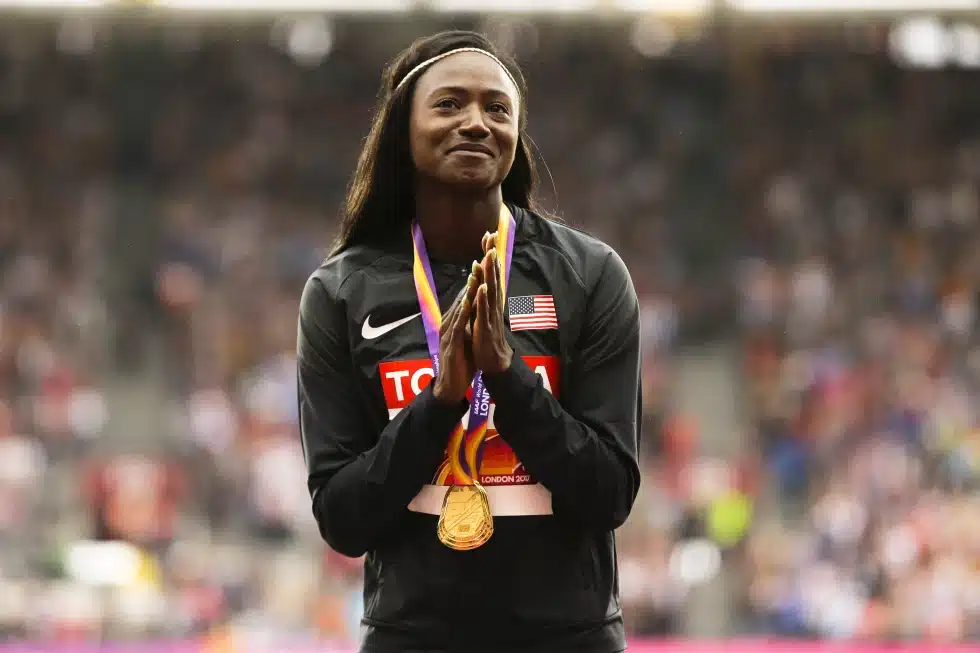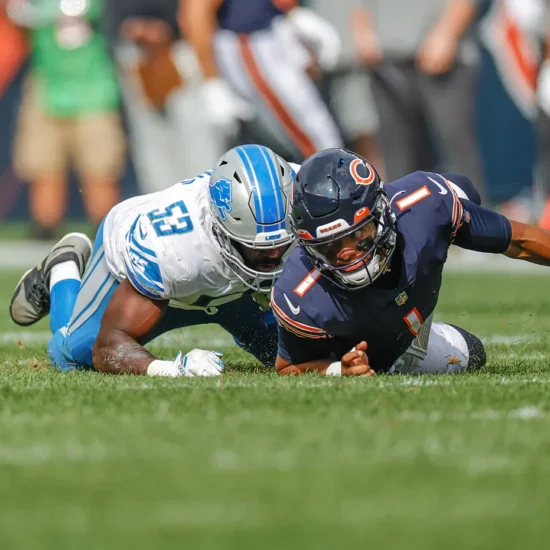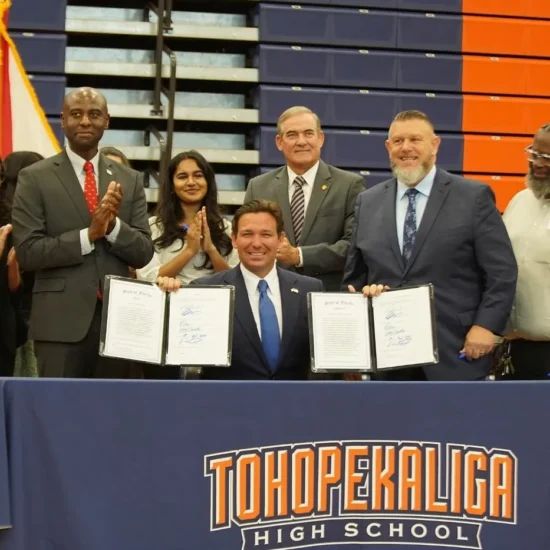
I haven’t run the 100-meter dash in more than 20 years, but somehow every time I watch the sprinters crouch down into their blocks before the starting gun goes off my heart resumes its familiar old pounding rhythm.

Angela Denker
Like a horse galloping down the final straightaway, I can hear it pounding in my chest, the familiar words:
On your marks …
I put both hands in front of me, just before the starting line. Head down. My teammate is standing behind me holding the blocks steady.
Get set …
My calf muscles tense. My quads and hamstrings and gluteal muscles squeeze in tandem, pulling my knees up off the ground. My fingers are shaking. My entire body is taut. Waiting.
GO!
And we’re off.
Track and field sticks with you, gets into your bones, even though the relay records I once held at my high school have long since fallen, and my long, triple, and high jump numbers never much improved no matter how much I practiced.
If I ever stood at the starting line of the 100-meter dash with three-time Olympic medalist Tori Bowie, by the time we got to the end of the race, she would have been able to stand on the finish line for a few seconds, waving to me as I finished behind her. Her sprinting would have made me look like I was jogging leisurely.
And still, when I go back to that place — muscles tense, brain whirring, waiting for that gun to go off so the runners can start — I feel a certain kinship with Tori Bowie. Sprinting seems simple, except it’s not. You spend hours conditioning and lifting weights; endless afternoons on a sultry track rehearsing starts and watching videos — and then there’s the mind-numbing detail of relay handoffs and counting steps for long jump and triple jump.
Bowie made it look easy, even when it wasn’t. Couldn’t be.

FILE – United States’ Tori Bowie gestures after receiving the gold medal she won in the women’s 100m final during the World Athletics Championships in London, Monday, Aug. 7, 2017. (AP Photo/Alastair Grant, File)
I’ve been thinking about Tori Bowie a lot lately. Last month the news broke that her April 23 death was caused by complications of childbirth, including eclampsia and respiratory distress. News reports also shared the death of a stillborn daughter, likely the same daughter, Ariana, named in Bowie’s funeral bulletin.
Bowie’s death wasn’t known until May 2, an estimated eight(!) days after she was determined to have died, when authorities performed a welfare check at her Florida home after she hadn’t been seen or heard from in several days.
When I first heard this news, it stopped me cold. I just kept reading news articles and then sitting quietly — imagining — how in the hell this could have happened.
Of course, part of Bowie’s story isn’t as shocking as it should have been. We’ve long documented and known the severe risks and health disparities faced by African American pregnant women giving birth in this country. Black women are three times more likely to die in childbirth in America than white women. And Bowie is not the first high-profile Black athlete to suffer maternal health complications. Tennis star Serena Williams nearly died in childbirth just last year, a harrowing experience she later detailed for ELLE magazine. Bowie’s relay teammate, track star Allyson Felix, also suffered from pregnancy complications including severe preeclampsia before an emergency Caesarean section likely saved her life.
Bowie didn’t have all the same privileges Williams and Felix did, though her athletic star rose as theirs did. We don’t know why Bowie didn’t seem to have access to adequate prenatal care, though doubtless the inherent racism of America’s healthcare system was a contributing factor. Bowie had previously been diagnosed with bipolar disorder, and again, preexisting prejudice against people with mental illness could have meant that providers didn’t take her concerns seriously, or bipolar disorder (complicated again by likely lack of access to medical care) may have made it difficult for Bowie to maintain relationships with her friends and family — or maybe preexisting trauma made this impossible.
And we haven’t even discussed the disparity and lack of access to health insurance even for elite, well-compensated track stars like Bowie, who probably wouldn’t have had employer-provided health insurance when she died this past spring.
The last time Bowie was in the news prior to her death appears to be in January 2019, when she arrived at the Elite Athlete Training Center in Chula Vista, Calif., to resume training after the holiday break. Upon arrival, she said staff told her she owed $6,000 and was no longer allowed on the premises unless she paid. That story also included reference to prior disagreements with her training staff and agent, as well as a physical altercation with a former teammate the year prior.
Reporting for FloTrack, journalist Lincoln Shryack quoted Bowie as saying in 2019, “I’m not even looking for any sympathy — I’m just, like, confused. I’m just trying to find out the situation right away,” she said.
She was just 32 years old, having been competing professionally in track and field since she was 23. She was just a year post a glamorous shoot for VOGUE Magazine that called her “the fastest woman in the world,” complete with photos by famed photographer Annie Leibovitz. And she was just three years past her glorious performance at the 2016 Rio Olympics, where Bowie took silver in the 100m and bronze in the 200m, winning a gold medal as well with the 4×100-meter relay team.
Rio was a long way from Sand Hill, an unincorporated rural community in Rankin County, Miss., where Bowie was born on Aug. 27, 1990. Sand Hill is less than 25 miles from the Central Mississippi Correctional Facility, which housed Mississippi’s female death row inmates. At ages 1 and 2, Bowie and her sister, Tamarra, entered foster care, while their grandmother, Bobbie Smith, entered a custody battle to to eventually gain legal guardianship. Tori had previously spoken about her admiration for her grandmother, and the role she played in giving Tori and her sister opportunity and drive for a better life. Both sisters eventually excelled in athletics at Pisgah High School, known for its track and basketball teams, and Tori’s talent and work ethic were evident immediately.
The sisters’ internal strength and resilience are awe-inspiring. I couldn’t find much information about their parents, except that Bowie had said her dad was “in and out of her life,” and said the fact that she kept her mom’s last name was “unfortunate.”
Still, we know that trauma and difficulty and poverty doesn’t happen in a vacuum. I don’t know under what circumstances Tori’s mother gave birth to her and her sister. But I can’t imagine they were ideal, either, here in the supposed “land of the free,” where everyone is supposed to have access to “life, liberty, and the pursuit of happiness.” I’m guessing Tori’s mom didn’t have much of a shot at any of the three.
For poor, Black, pregnant women in Mississippi, even as late as 1990, the odds were likely stacked against Tori’s mother. Just as, in so many heartbreaking ways, they remained stacked against her beautiful, talented, and decorated athletic daughter.
After Tori’s death, her sister Tamarra, now an attorney with her own law firm, posted on Facebook: “People who pretend to be happy have some of the saddest souls and people who do not try to convince the world that they are happy have the most genuine souls, because they are content with just being them for them and nobody else.”
As of 2023, Tori Bowie had accomplished so much. Not only was she a star athlete, but she had scored endorsements and modeling jobs. She had almost 50,000 followers on Instagram, where her global travels documented a lifestyle worth envying.
But Bowie hadn’t posted on her Instagram since October 2019. It had seemed to be a difficult year in her life, a difficulty easily understandable for many elite athletes, who often face a challenging transition to life after elite sports. They often talk about having hours and hours of blank time, and an overwhelming amount of freedom — after years of strict dietary and training regimens; a life filled with teammates and coaches can become isolated and lonely.
That certainly seems to have happened in Bowie’s case. I couldn’t find any information about the father of her daughter, and I’m not sure if they had a relationship or if he was even involved at all. But she was clearly isolated, alone, and without the help and support so badly needed by any pregnant person, much less one with Bowie’s background.
Don’t miss the next issue of Angela Denker’s newsletter “I’m Listening.” Sign up now!
I watched old videos of her sprinting, and Bowie is amazingly strong. Lithe, powerful, muscular, undeniably in peak physical condition; the kind I used to watch in the Olympics and marvel at, comparing those sprinters’ bodies to my own stretched out stomach and thighs criss-crossed by stretch marks after my own three pregnancies, and two healthy births by C-section.
I have no doubt that some of what Bowie faced, when she may have needed help in her pregnancy and didn’t get it — was that toxic combination of racism, sexism, and classism so common in America. We’ve all heard the limiting and prejudiced trope of the “strong Black woman,” which, while often true, also gives people an excuse not to lend a hand, or to fail to see Black women as complex people in need of our support, love, and up-lifting. To take a step back further, there is well-documented history of racist pseudo-science that attempted to attest to the superior physical strength of Black people, while also claiming that Whites were mentally superior.
All of this history lurked in the background of Bowie’s tragic, avoidable death. The same ideas about denying female pain, and assuming poor people could handle more physical labor than rich people, all conspire together to deny care for pregnant people in need, most of them non-white, poor, and rural.
Bowie’s story is hers alone. Her tragedy is uniquely hers: a sprint that should have, could have, been a marathon. A life so hard-fought, ended far, far too soon. Before she told us everything she could have told us. Before she got to be a mom to her daughter. Before she got to try to be the mom she never had herself.
Last week, while I was thinking about Tori Bowie and about the pregnancy that killed her, I spent back-to-back days at elementary school end-of-year parties in our urban neighborhood, for my two sons. I ran with them, heedless, across a dirt-covered kickball field, my legs covered with dust. I unwrapped Icees and told 6 and 7 year-olds where first base was. I talked with other parents and teachers, and we said the things you always say, about how it all goes so fast, and we were so tired, and we loved our kids so much.
I’ve been a mom for almost 11 years now. Eleven years ago I was six months pregnant, swollen and miserable in a little townhouse in Las Vegas, waddling around my doctor’s office at just age 27, worrying about deli meat and caffeine and if I could take ibuprofen or not.
While I was living on an intern’s salary, I had access to quality medical care. I had a spouse helping pay our bills, and extended family on both sides who could offer financial and emotional support.
And still, we moved across the country in my eighth month of pregnancy, and a week later we found out my son was breech. I endured a painful version procedure, which didn’t work, and luckily ended up with an uneventful planned C-section. Then, I had trouble breastfeeding, and trouble adjusting alone and raising a baby thousands of miles from extended family and friends.
And I was so incredibly lucky.
We raised that little boy in a 1-bedroom apartment outside San Francisco, with an Amazon-purchased room divider separating our bed and his crib. Day by day, he’d come with me to grad school classes, and we’d walk the paths outside our apartment building, and when he was 11 months I got a new job and we moved to the Chicago suburbs.
Two years later, a pregnancy ended in miscarriage.
Three years later, his little brother was born — this time, scarily, by emergency C-section. I got mastitis and a high fever a few days later, but again, we had access to medical care. I got antibiotics, the baby was fed by breast and by bottle; I had paid maternity leave and a supportive community, and we all survived.
I’m sure many of you have your own stories. Your own joy, your own pain; your own close calls.
I don’t think anyone with a uterus can read Tori Bowie’s story and not feel that sharp pain in your gut. But for the grace of God go I.
Tori Bowie was once one of the fastest women in America, and she was also undeniably fragile. We’ve made mothers, especially Black mothers, and Indigenous mothers, and poor mothers, and mothers with mental illness, and mothers with addiction, and all mothers undeniably fragile in America.
Those enacting the current discriminatory laws against pregnant people and their medical care in America right now claim they are protecting mothers and families. But all they are doing is continuing to make us more scared and vulnerable and alone, like Tori was. They’ve failed to see the complexity and fragility and connectedness between us, and all we carry and suffer from, and the miraculous new life inside our wombs.
What if instead of legislating around poverty and racism and sexism and classism and America’s undeniable legacy of violence against women and non-white people — what if instead of that we all stepped back and listened to pregnant people? What if, back in 2019 when she was struggling, we’d listened, really listened, to Tori Bowie?
Maybe then we could have heard the story of her life, and the life of her unborn child, instead of only lamenting, and sobbing, in the aftermath of the story of her unjust, yet uniquely American, death.
The Black Mamas Matter Alliance (BMMA) is a Black women-led cross-sectoral alliance that centers Black mamas and birthing people to advocate, drive research, build power, and shift culture for Black maternal health, rights, and justice. To support their work, you can donate here, in honor of Tori Bowie.
Angela Denker is a Lutheran pastor and veteran journalist. She has written for many publications, including Sports Illustrated, The Washington Post, and FORTUNE magazine. Denker has appeared on CNN, BBC, and SkyNews to share her research on politics and Christian Nationalism in the U.S. Her book, Red State Christians: Understanding the Voters who elected Donald Trump, was the 2019 Silver Foreword Indies award-winner for political and social sciences. The revised edition of Red State Christians, subtitled: A Journey into White Christian Nationalism and the Wreckage it leaves behind, came out Aug. 16 and is currently available everywhere books are sold.






